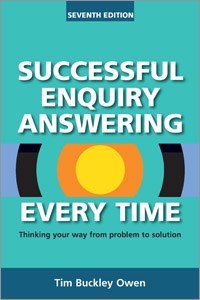
Primary tabs
You don't need to be an ALA Member to purchase from the ALA Store, but you'll be asked to create an online account/profile during checkout to proceed. This Web Account is for both Members and non-Members. Note that your ALA Member discount will be applied at the final step of the checkout process.
If you are Tax-Exempt, please verify that your account is currently set up as exempt before placing your order, as our new fulfillment center will need current documentation. Learn how to verify here.
- Description
- Table of Contents
- About the author
- Reviews
When people want to satisfy their immediate curiosity they’re much more likely to use a search engine on their mobile device than ask their local library. But while the days of personal intervention in this kind of enquiry are inevitably numbered, the professional skills that underpin them are not. This book uses technology as the enabler of the thought processes that information professionals need to engage in when answering enquiries, and makes the case that new technology, far from making them irrelevant, raises the skill stakes for all.
Successful Enquiry Answering Every Time is designed to guide information professionals through all the stages of research, from finding out what the enquirer really wants, to providing a polished, value-added answer.
Now in its seventh edition, this book is fully updated to cover new skills, such as
- employing critical thinking to manipulate, categorize; and prioritize raw search results;
- using strategic reading and abstracting techniques to identify and summarize the essential information the enquirer needs from the retrieved documents;
- drawing on established storytelling practice to present research results effectively, whether orally or in writing; and
- working to the POWER model: plan, organize, write, edit, review.
This book is ideal for anyone who has to answer enquiries from users in any information role; those working in contact centers who are dealing with information enquiries, processing transactions or troubleshooting technical issues; and information professionals working on enquiry desks in large or small academic, public, school or special libraries.
Introduction: Why thinking skills matter
Eight essential thinking skills for successful enquiry answering
1 What do they really want?
Using your analytical thinking skills to understand the question
Avoiding misunderstandings
Asking the right questions
Does all this really work?
Agreeing the task
Finding out how long you’ve got
Coming next – when the enquirer’s not there
2 Why remote enquiry handling is different
Anticipating problems by thinking emphathetically
Can’t see, can’t hear – the risk of misunderstanding, even offence
Keeping your remote enquirer on-side
Keeping good records
Coming next – avoiding panic, thinking on your feet
3 Getting started
Dealing with the panic by thinking imaginatively
Imagining the final answer
Choosing the best type of source and delivery medium
Does all this really work?
Identifying actual sources
Coming next – smarter searching
4 Smarter searching
Developing efficient search strategies by thinking systematically
Who needs to be able to search smarter?
Working out your search strategy
Searching systematically
Making the most of indexes
Electronic search tools
Reading strategically
Making sure that what you find is reliable
Coming next – even more things that can go wrong
5 Help! Everything’s going wrong
Using lateral thinking to get out of difficulties
Vital versus urgent tasks
Your working timetable
Managing expectations
Plan B
Referrals
Coming next – adding value
6 Success! Now let’s add some value
Using your creative thinking skills to present your answer well
Quality-checking your answer
Presenting your answer – orally
Presenting your answer – in writing
Copyright, licensing, ethics
Has the answer arrived – and does the enquirer like it?
Sign-off: what can we learn from this enquiry?
Coming next – adding even more value
7 Don’t just give me another reading list!
Using critical thinking skills to add further value to your answer
POWER and KISS
Making your search results manipulable
Selecting, rejecting, prioritizing 140
Strategic reading – finding the best bits of each document
Capturing the content for your report
Now you’re ready to write!
Making sure your work gets read and valued
Coming next – choosing your toolkit
8 Choosing your toolkit
Using your predictive thinking skills to determine the resources you’ll need
Making best use of your Time, Intellect and Money
Keeping track of your enquiries
Discovering information in your own resources (and beyond)
Choosing and using the right search engine
Adding value to your search results
Starter Sources
Your goal: successful enquiry answering – every time
Index
Tim Buckley Owen
Tim Buckley Owen is an independent writer and trainer with over 40 years' experience of information work, at Westminster Central Reference Library, the City Business Library, and as Principal Information Officer at the London Research Center. He has also held strategic media and communications posts at Chartered Institute of Library and Information Professionals (CILIP); the Museums, Libraries & Archives Council; and the Library & Information Commission.
"Owen is incredibly thorough in this exhaustive presentation of strategies and different outlets for research, which is what makes this text a strong pick for any information professional, but particularly for students developing their search strategies and those in academic, medical and special library fields."
— VOYA


